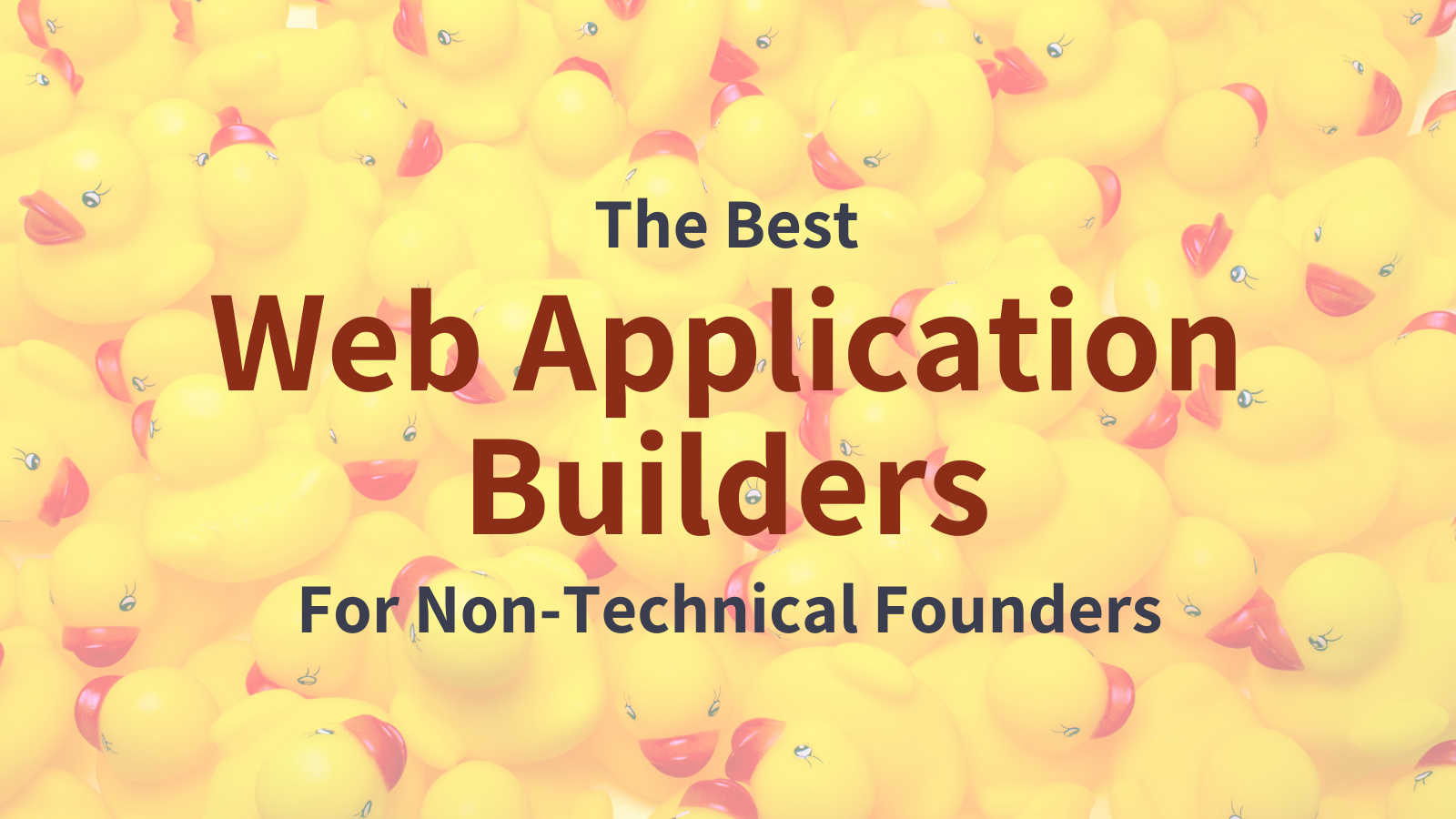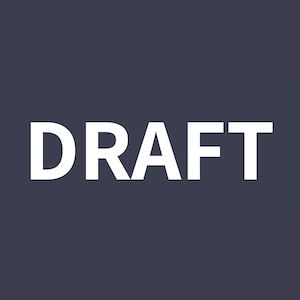10 Web Application Builders for Non-Technical Startup Founders

It’s amazing how much has changed in web application development over the past 20 years that I’ve been building software. The options for building a web app without code are much better than they were when I was coming out of college, but having so many options is truly overwhelming.
I was the first engineer at CTO at a couple of early-stage tech startups, so one of the questions I get the most from non-technical founders is, “what tools should I use to build my web app before I can hire a full-time developer?”
In this post, I’ll share some of the best web application builders I’ve seen for non-technical founders to build MVPs and POCs. Some of these are AI-based coding tools while others are more traditional “no-code” builders. Let’s dive in!
Sponsor

Want Great Content Like This for Your Site?
At Draft.dev, we create technical content for startups looking to reach software engineers. Stop begging your engineers to write blog posts and build a high-quality, reliable content engine today.
1. Cursor
Cursor is an AI-powered code editor that’s particularly well-suited for non-technical founders building relatively straightforward web apps. Built on top of VS Code and integrated tightly with GPT-4, Cursor lets you write prompts like “create a user login page” or “add Stripe payments” and receive working code snippets, suggestions, or even entire files.

Cursor’s going to work best for founders who are willing to learn just enough code to describe what they want and then iterate with AI help. Cursor has a free plan with usage caps, and paid plans start at $20/month, offering more generous GPT-4 usage and collaboration features. The main limitation is that you’ll still need some basic programming literacy to deploy or modify more complex apps because it’s not a pure drag-and-drop builder like some no-code platforms. Still, for tech-savvy non-engineers, Cursor can dramatically accelerate the early prototyping and MVP phase.
2. Nicepage
Nicepage is a visual website builder allowing you to create responsive websites, landing pages, and website templates without coding. It features a drag-and-drop user interface, 15,000+ designer-made website templates, automatic responsive modes, and export to HTML, WordPress, and Joomla. You can work with Nicepage on Windows and Mac OS as a desktop application, WordPress and Joomla plugins, and online.

Unlike code-based applications like Cursor, Nicepage won’t require you to touch a code editor, so it’s going to be much more accessible for founders who really don’t want to take the time to learn programming and do want to focus on sales and marketing efforts.
3. Bubble
Note: I wrote a detailed overview of using the Bubble app builder for your startup here.
Bubble features a chat-based and a drag-and-drop interface, allowing for multiple ways to create your web application, and it’s packed with connectivity integrations. For example, you’re able to connect your own SQL database to the application, allowing you to later migrate away from Bubble or share data with other business applications as you grow. Bubble has an active community online (forums) and in person (local meetups). Pricing starts with a free tier that supports basic apps, while paid plans begin at $32/month for more advanced features like custom domains, API integrations, and backend workflows.
Bubble is pretty amazing, but it does come with a learning curve. While you don’t need to code, you do need to understand application logic, database structure, and user experience design. Additionally, apps built on Bubble can face performance limitations as they scale, and migrating away from the platform later can be difficult due to its proprietary framework. Still, for many non-technical founders, Bubble offers one of the fastest paths to building a real, functional web app.
4. Shopify
Shopify is a powerful, user-friendly platform that’s great for non-technical founders who want to quickly launch and scale e-commerce web applications. With its intuitive drag-and-drop store builder, extensive theme library, and robust app ecosystem, Shopify makes it easy to set up everything from simple product catalogs to complex multi-channel sales operations—no coding required. It also handles hosting, security, payment processing, and inventory management out of the box, allowing you to focus on their products and customers. Pricing starts at $39/month for the Basic plan, with transaction fees unless you use Shopify Payments.
While Shopify is excellent for e-commerce MVPs and storefronts, it’s not going to work for custom web applications that aren’t centered around selling products. Additionally, customizing functionality beyond what apps and themes offer may require hiring a developer familiar with Shopify’s Liquid templating language. For founders building a commerce-focused business, though, Shopify is probably the best option on this list.
5. Sheet2Site
Google Sheets is an easy, powerful, and free online spreadsheet application. But what if you could use the data in a Google Sheet to create a website? That’s what Sheet2Site does. Pricing starts at $29/month for the Basic plan, which includes a custom domain and email support, with higher tiers offering more advanced customization and integrations.
One key limitation is flexibility. While Sheet2Site is great for simple, structured content, it’s not suitable for more complex application logic or interactive workflows. Still, for non-technical founders looking to ship something quickly and validate an idea, Sheet2Site offers one of the fastest, lowest-effort paths to a live web presence.
6. Lovable
Chat-based interfaces are all the rage now, thanks to the preponderance of LLMs. Lovable is another relatively new no-code web app builder focused on helping non-technical founders create beautiful, functional SaaS products with minimal effort. Its unique selling point is a tightly integrated, opinionated design system that makes it easy to produce polished user interfaces out of the box—perfect for founders who care about aesthetics but don’t have a design or development background. With built-in support for user authentication, databases, and logic workflows, Lovable enables you to go from idea to live MVP quickly. Pricing starts at $40/month, with a 14-day free trial to explore its features.

The big drawback is that because it’s a relatively new platform, Lovable doesn’t have the ecosystem, third-party integrations, or scalability that more established tools on this list have. It’s best suited for early-stage SaaS founders who want a fast, design-forward way to launch and iterate on their product without getting bogged down in technical details.
7. Zoho Creator
Zoho Creator is primarily for internal tools, so if you’re building something with a small userbase and intensive data requirements, this might be the right option for you. Their drag-and-drop web application builder features pre-built apps such as “Time Tracker”, “Project Tracker”, “Appointment Management”, “Contacts”, and more. Plus, it integrates with the Google Suite, QuickBooks, PayPal, and many other popular applications.
8. Thunkable
Thunkable is a drag-and-drop builder cross-platform mobile and web apps without writing code. It’s particularly well-suited for non-technical founders as it targets both iOS and Android with a single app build. Thunkable supports API integrations, animations, logic flows, and even features like camera access and push notifications. The platform includes a free plan for basic prototyping, while paid plans start at $15/month, scaling up with additional publishing options and support.
Thunkable offers a lot of flexibility, but building complex logic-heavy apps still requires a bit of a learning curve, and performance can be a concern in large-scale applications. Still, it’s a great option for mobile-first MVPs or proof-of-concepts.
9. Softr
Softr is a no-code platform that allows you to build full-featured web apps, client portals, and internal tools directly from Airtable or Google Sheets. As a heavy Airtable user myself, I love Softr because it gives you a good looking frontend for even the biggest, most complex Airtable backends.
Softr includes features like user authentication, gated content, search functionality, and integrations with tools like Zapier and Stripe. The pre-built templates for marketplaces, directories, job boards, and dashboards make Softr ideal for non-technical founders looking to quickly launch a marketplace site. Like many no-code platforms, it’s limited in terms of backend customization and complex workflows, but it strikes a great balance between speed, flexibility, and ease of use.
10. Glide
Finally, Glide lets you turn Google Sheets or Excel files into powerful mobile and web apps without writing any code. It’s especially useful for building internal tools, CRMs, inventory trackers, or lightweight client portals, and offers a well-designed interface with built-in components for forms, calendars, and charts.
The free plan allows for basic apps with limited rows of data, while paid plans start at $60/month for more advanced features, integrations, and custom domains. Scalability is probably your biggest limitation. Glide apps are best suited for simpler use cases or internal-facing tools rather than full-scale public SaaS products. Still, its ease of use and spreadsheet-based logic make it incredibly accessible for non-technical founders.
Conclusion
The ecosystem of web and mobile app builders for non-technical founders is growing every day, so while this list includes my favorites in 2025, I’m sure I’ll have to come back to this post to update it often. If you have a favorite that I should check out, tell me about it, so I can keep this list up-to-date with all the latest options!
